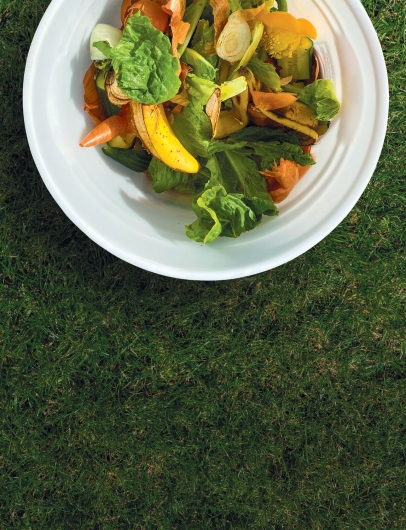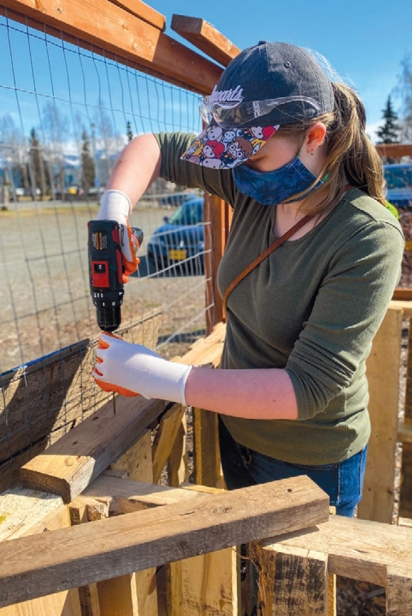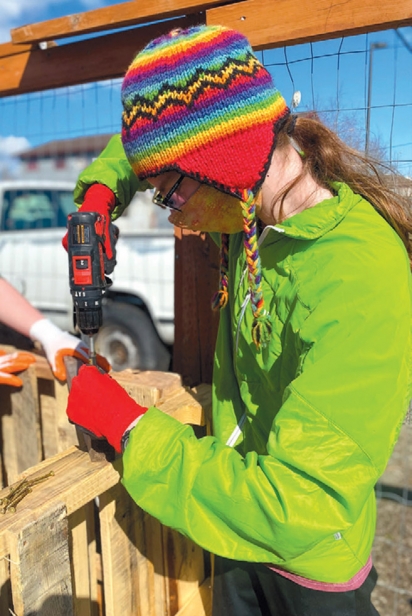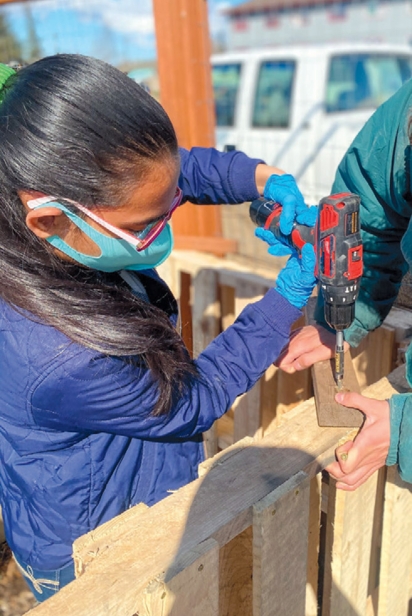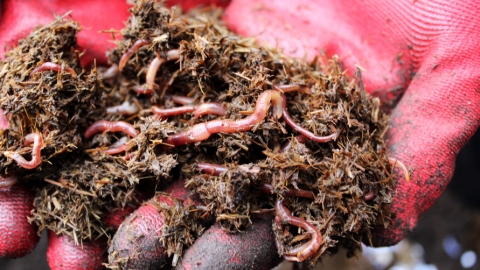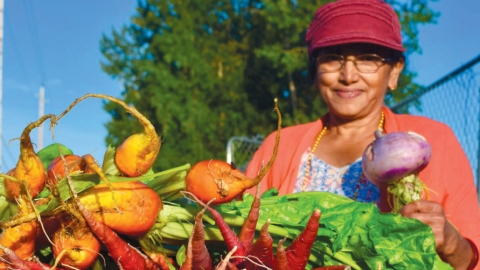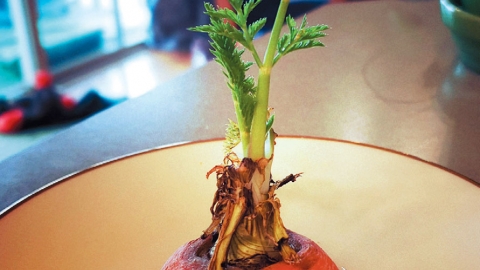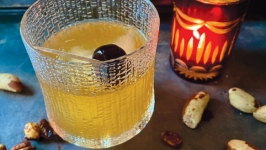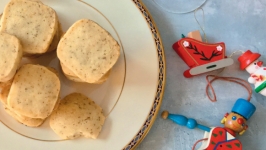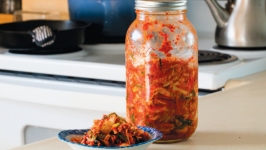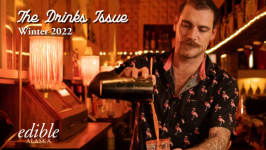One Bucket at a Time
Editors’ note: This fall, contributor S. Hollis Mickey invited some young writers to take over her Culinaria Obscura column and share their story of fighting climate change through reducing food waste. According to the US Composting Council, composting helps the climate by diverting food waste from landfills where it could release methane. Composting itself produces little to no methane. They continue to say that “a portion of that composted organic matter may become part of the soil’s long term carbon pool,” resulting in further carbon sequestration. And, soil that is fed with good compost has better “moisture holding capacity and a reduction in the need for fertilizers, herbicide and fungicide,” which means fewer chemicals and less energy used to produce food. A win, win, win. We’re proud of these students not only for making their composting project happen, but also for documenting it and sharing it with Edible Alaska readers.
Riley Conti: As someone who believes in the future of this world and is about to enter the workforce, it is very important to me that Alaskans are working together for a better future. I am dedicated to working for a more sustainable future, and this is one step towards that goal. My name is Riley Conti; I am 15 and going into tenth grade at West Anchorage High School. Ever since I was little, my family was lucky enough to be able to make sustainable choices like composting, buying local or organic, and installing solar panels. However, I have always wanted to do more. When I heard from my English teacher about a museum-run project, Teens for Climate Action (TFCA), I was psyched. After attending the museum’s virtual summit, we were split into three different teen-led groups, and each took on climate change in our community. Our group, the students of West High, focused on “food systems,” and we approached the problem full throttle. Initially, we hoped to compost directly on campus, but we ran into some difficulty with the sanitation restrictions. But then, through the help of Nick Riordan, we came into contact with Grow North Farm and started working with them.
Clarie Evans: From an early age, we have been taught about the dangers of climate change. Over and over, we have learned how our world is falling apart, and how no one does anything to stop it. Growing up, we see how bad it is—the melting permafrost, receding glaciers—and wonder “why?” Why are we unable to fix it? And then we learn it is not that simple, but we just cannot understand why. And we never really learn why. But I want to understand why, because understanding why we cannot change is the key to understanding how we do.
Vaishnavi Gornale: Oftentimes, we see issues around our world and feel helpless. We are one person against so much we feel must be fixed. But I have come to learn that taking small steps, doing things that might seem insignificant in the grand scheme of things might not actually be insignificant at all. Allowing yourself to be educated about a certain issue is a step forward. Then, talking about it to other people is another step forward. Joining organizations that fight against these issues is another. At first, your actions may seem too small to matter, but over time you will come to realize each step is as crucial as the next.
One of our group members, Madeleine Cannon, wrote: “Youth leadership is incredibly important to me... it is an experience for people that allows them to learn how to lead as they grow and walk through life.” To all of us, youth leadership is the way we interact with the world; it is how we make a difference, and make our voices heard. We each share a perspective characteristic of our generation: that we need change in the basic foundations of our society. Yet so much of that change seems unreachable when we talk about individual families and teens, who cannot afford to give up cars or buy organic produce. We are stuck in a cycle of need that cannot be met, and we let the problem perpetuate simply because we feel unable to find a solution.
Our approach to this problem was to take the small steps that were accessible. We needed to make a system that is practical for families to implement and easy to sustain. Many of our ideas were short-term, or prohibited by our school’s restrictions. Yet despite these difficulties, we managed to find exactly what we were looking for, in the most unlikely of prospects: compost. We realized that it would be easy for families to collect food scraps, and if we were able to streamline the actual process of collection, we would have a very sustainable system.
Over the past few months, we have developed a compost-bucket distribution system, which will hopefully be extended towards students at West. A locally owned donut shop, Golden Donuts, generously donated their reusable five-gallon buckets towards our pilot program, in which members of our group tested the project on a smaller scale. Those participating in the pilot program collected household food scraps in these buckets, then brought their food waste to the compost bin we built at Grow North Farm (the bin consists entirely of reused pallet boards). This waste is currently being composted and reintroduced to the soil, supporting farmers from the Refugee Assistance and Immigration Services program.
Now, simply through our pilot program, we have repurposed the food waste of eight families. Imagine what we could do if we were successful in introducing this system to dozens more. And, if the expansion works as well as we hope, we will implement a community collection bin to streamline the composting process for West families. If we are able to expand our project, the difference we make will be felt in the larger Anchorage community, extending the life of our rapidly filling landfill.
Despite the hindrances of a global pandemic, such as meeting virtually and dealing with uncertainty, we achieved our goal; and perhaps we were stronger for it, too. Our virtual meetings turned into opportunities for better communication and stronger leadership: we delegated expertly, and created an organized flow of information through the systems used by our school. Our limited community outreach developed our interpersonal skills as we dealt with dozens of emails and phone calls. The uncertainty surrounding COVID regulations led to plans within plans, which ultimately helped us prepare for unexpected outcomes. All of what we learned are skills that we will use in the future. We feel we will be stronger for the challenges we faced.
We had amazing community support. For example, the nonprofit we partnered with, Grow North Farm, supported us throughout the entire project, guiding us through all the intricacies of composting. Grow North staff taught us about the benefits of anaerobic versus aerobic composting, helped us discuss a large-scale expansion, and offered their own property for our compost bin. Not only that, but the compost they helped us generate will be fed back into their own project: a support system for growing farmers who hail from seven different countries, each learning about the sustainable food industry.
Places like Grow North Farm are the beginning. We want those values of community and sustainability to become just as vital to all, to make our world truly better… but one of our group members reminded us that “[we] do not have to try and solve everything.” And they are absolutely right, because we cannot solve everything, no matter how hard we try. There are limits to what we can overcome, there are battles we cannot win, and that is okay because we are doing all we can. And maybe someday, we will get to that far off “solution.” But for now, we are just taking it one step at a time, and one bucket of compost at a time.


